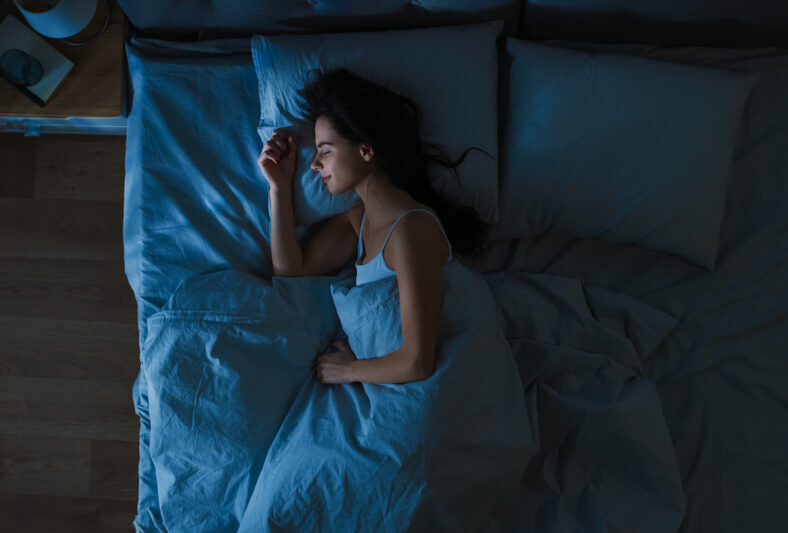How Hormones and Sleep Are Connected
Have you ever found yourself tossing and turning at night, staring at the ceiling, wondering why sleep just doesn’t seem to come as easily as it used to? It’s a common experience, especially as we age or when stress creeps in. What many people don’t realize is that sleep quality is closely tied to hormones. In fact, hormones are a major driving force behind how well—or poorly—we sleep. From regulating our circadian rhythm to managing stress levels, hormones play a crucial role in ensuring we get the restorative sleep our bodies need. Let’s dive into how these intricate chemical messengers impact sleep quality and what we can do to support better sleep through hormonal balance.
The Circadian Rhythm and Melatonin
One of the most well-known hormones involved in sleep regulation is melatonin. Often referred to as the “sleep hormone,” melatonin is produced by the pineal gland in response to darkness. Its primary role is to signal to the body that it’s time to wind down and prepare for sleep. However, melatonin is just one part of a much larger system known as the circadian rhythm, our body’s natural sleep-wake cycle.
The circadian rhythm is regulated by a variety of hormones, including cortisol and melatonin, and it follows a roughly 24-hour cycle. When melatonin levels rise in the evening, we start to feel sleepy. Conversely, as the morning light enters our environment, cortisol levels increase, signaling that it’s time to wake up and be alert. Disruptions to this rhythm, such as exposure to artificial light at night or irregular sleep patterns, can throw off hormone production, leading to poor sleep quality.
Key factors that disrupt melatonin production:
- Exposure to screens or artificial lighting in the evening
- Shift work or irregular sleep schedules
- Traveling across time zones (jet lag)
To support melatonin production naturally, it’s important to create a consistent bedtime routine, dim lights in the evening, and avoid screens at least an hour before bed.
Cortisol: The Stress Hormone
While melatonin helps you fall asleep, cortisol—often called the “stress hormone”—can interfere with your ability to stay asleep. Cortisol is produced by the adrenal glands in response to stress, and it plays an important role in regulating energy levels, metabolism, and immune function. In the morning, cortisol levels naturally rise to help wake you up. However, if cortisol remains elevated due to chronic stress or anxiety, it can keep you wired, making it difficult to relax and fall asleep.
High cortisol levels at night are often linked to insomnia, frequent waking, and an overall poor sleep experience. This is because cortisol inhibits the production of melatonin, preventing the body from fully relaxing. Over time, this can lead to a vicious cycle: poor sleep increases stress, which in turn raises cortisol levels, further disrupting sleep.
To break the cycle of stress-induced insomnia, it’s essential to focus on stress management techniques such as meditation, deep breathing exercises, and incorporating relaxation routines into your evening.
Estrogen and Progesterone: Sleep and the Female Hormonal Cycle
For women, two key hormones that play a significant role in sleep quality are estrogen and progesterone. These hormones fluctuate throughout the menstrual cycle, pregnancy, and menopause, affecting sleep patterns at various life stages.
During the menstrual cycle, estrogen levels are highest just before ovulation, promoting increased energy and often better sleep. However, in the days leading up to menstruation, progesterone levels rise, which can lead to disrupted sleep for some women. Progesterone has a calming effect on the brain, but as it declines just before menstruation, sleep disturbances such as insomnia or frequent waking may occur.
In menopause, declining levels of estrogen and progesterone can exacerbate sleep issues. Hot flashes, night sweats, and mood swings, which are common during menopause, are closely tied to these hormonal changes and can severely impact sleep quality. Bioidentical Hormone replacement therapy (BHRT) is one potential solution for managing menopausal symptoms, including sleep disturbances. However, lifestyle changes like improving sleep hygiene, practicing relaxation techniques, and managing stress can also help.
Testosterone and Sleep in Men
Men, too, experience hormone-driven sleep disruptions, particularly due to fluctuations in testosterone. Testosterone is a hormone primarily associated with muscle mass, libido, and energy levels, but it also plays a role in sleep regulation. Men with lower testosterone levels are more likely to experience sleep disturbances, including insomnia and sleep apnea.
Testosterone levels naturally decline with age, but stress, poor diet, and lack of exercise can accelerate this decline, further contributing to poor sleep quality. Studies have shown that testosterone replacement therapy (TRT) may help improve sleep in men with low testosterone, though it’s essential to consider the potential risks and consult with a healthcare provider.
Thyroid Hormones: A Delicate Balance
The thyroid gland plays a critical role in regulating metabolism, energy levels, and body temperature, all of which are closely linked to sleep. The thyroid produces two main hormones: triiodothyronine (T3) and thyroxine (T4), which help regulate the body’s metabolic processes. When the thyroid is underactive (hypothyroidism), individuals may experience fatigue and an overwhelming need for more sleep, but the quality of that sleep is often poor. On the other hand, an overactive thyroid (hyperthyroidism) can lead to anxiety, restlessness, and insomnia.
Both hypothyroidism and hyperthyroidism can affect sleep quality, so maintaining optimal thyroid function is crucial for restful sleep. Regular checkups and blood tests can help identify thyroid imbalances early on, and treatments such as medication or dietary changes may help regulate thyroid function, improving sleep in the process.
The Role of Growth Hormone in Deep Sleep
The growth hormone is another hormone closely tied to sleep. Released by the pituitary gland, growth hormone is primarily secreted during deep sleep, especially during slow-wave sleep (SWS), which is the most restorative sleep phase. Growth hormone is responsible for tissue repair, muscle growth, and overall body rejuvenation.
Disruptions in sleep, particularly in deep sleep stages, can inhibit the release of growth hormone, leading to a reduced ability to repair and recover. This can leave individuals feeling fatigued and sluggish, even after a full night’s sleep. Conditions like sleep apnea, which interrupt sleep cycles, can severely impact growth hormone production, emphasizing the importance of addressing sleep disorders through medical intervention when necessary.
Insulin and Blood Sugar Regulation
Insulin, a hormone produced by the pancreas, plays a key role in regulating blood sugar levels. There’s a strong connection between blood sugar balance and sleep quality. When insulin levels are imbalanced, it can lead to blood sugar spikes and crashes, which may wake you up in the middle of the night or cause restlessness.
People with insulin resistance or diabetes often struggle with sleep disruptions due to erratic blood sugar levels. Poor sleep can worsen insulin resistance, creating a feedback loop that further impairs sleep. Managing blood sugar through diet, exercise, and, if necessary, medication, can help improve both sleep quality and overall health.
How to Support Better Sleep Through Hormonal Balance
Understanding the connection between hormones and sleep quality is the first step toward improving your rest. But how can you actively support hormonal balance to ensure you’re getting the best sleep possible? Here are some practical strategies:
-
Maintain a Consistent Sleep Schedule
Going to bed and waking up at the same time every day helps regulate your circadian rhythm and supports the production of melatonin.
-
Manage Stress Levels
Since cortisol can wreak havoc on sleep, finding ways to reduce stress—through mindfulness, exercise, or hobbies—can help lower cortisol levels and promote better sleep.
-
Create a Relaxing Bedtime Routine
Establish a calming pre-sleep routine, such as taking a warm bath, reading, or meditating, to signal to your body that it’s time to wind down.
-
Limit Blue Light Exposure
Reducing exposure to blue light from phones, computers, and televisions in the evening can support melatonin production and help you fall asleep more easily.
-
Support Hormone Health Through Diet
A nutrient-rich diet that includes healthy fats, lean proteins, and plenty of fruits and vegetables can support the production of key hormones involved in sleep, such as melatonin and serotonin.
-
Consider Hormone Therapy
For those struggling with hormone imbalances due to menopause, low testosterone, or thyroid issues, hormone replacement therapy (HRT) or thyroid medications may be helpful options. Always consult with a healthcare provider to determine if hormone therapy is right for you.
-
Address Underlying Health Conditions
If sleep disturbances persist despite lifestyle changes, it may be worth discussing possible hormonal or metabolic conditions with your healthcare provider. Blood tests can help identify imbalances that may be affecting your sleep.
Conclusion: Take Control of Your Sleep
If you’re struggling with poor sleep and suspect that hormones may be to blame, it’s time to take action. Hormones play a powerful role in how well we rest, and addressing imbalances could be the key to unlocking better sleep—and better overall health.
At Aryze Well, we specialize in hormone optimization and offer personalized plans to help you regain control of your sleep and your well-being. Whether you’re dealing with menopause, low testosterone, thyroid imbalances, or stress-induced insomnia, our team is here to help. Contact Aryze Well today to schedule a consultation and start your journey toward restorative, rejuvenating sleep.
Dr. Indea May is a seasoned healthcare professional with over 20 years of experience in nursing and holistic medicine. As the Clinical Director of Aryze Well, PLLC, she combines her expertise in functional medicine, bioidentical hormone replacement therapy (BHRT), medical weight loss, gut health restoration, and IV hydration to provide integrative and personalized care. Read More: https://aryzewell.com/meet-dr-indea-may/
- Indea May



